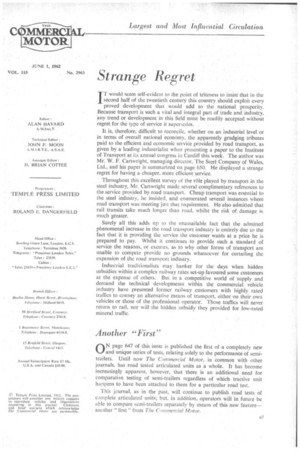Strange Regret
Page 41

If you've noticed an error in this article please click here to report it so we can fix it.
IT would seem self-evident to the point of triteness to insist that in the second half of the twentieth century this country should exploit every proved development that would add to the national prosperity. Because transport is such a vital and integral part of trade and industry, any trend or development in this field must be readily accepted without regret for the type of service it supersedes. . , It is, therefore, difficult to reconcile, whether on an industrial level or in terms of overall national economy, the apparently grudging tributes paid to the efficient and economic service provided by road transport, as given by a leading industrialist when presenting a paper to the Institute of Transport at its annual congress in Cardiff this week. The author was Mr. W. F. Cartwright, managing director, The Steel Company of Wales, Ltd., and his paper is summarized on page 650. He displayed a strange regret for having a cheaper, more efficient service.
Throughout this excellent survey of the role played by transport in the steel industry, Mr. Cartwright made several complimentary references t9 the service provided by road transport. Cheap transport was essential to the steel industry, he insisted, and enumerated several instances where road transport was meeting just that requirement. He also admitted that rail transits take much longer than road, whilst the risk of damage is much greater.
Surely all this adds up to the unassailable fact that the admitted phenomenal increase in the road transport industry is entirely due to the fact that it is providing the service the customer wants at a price he is prepared to pay. Whilst it continues to provide such a standard of service the reasons, or excuses, as to why other forms of transport are unable to compete provide no grounds whatsoever for curtailing the expansion of the road transport industry.
Industrial traditionalists may hanker for the days when hidden subsidies within a complex railway rates set-up favoured some customers at the expense of others. But in a competitive world of supply and demand th.e technical developments within the commercial vehicle industry have presented former railway customers with highly rated traffics to convey an alternative means of transport, either on their own vehicles or those of the professional operator.' Those traffics will never return to rail, nor will the hidden subsidy they provided for low-rated mineral traffic.






































































































































































